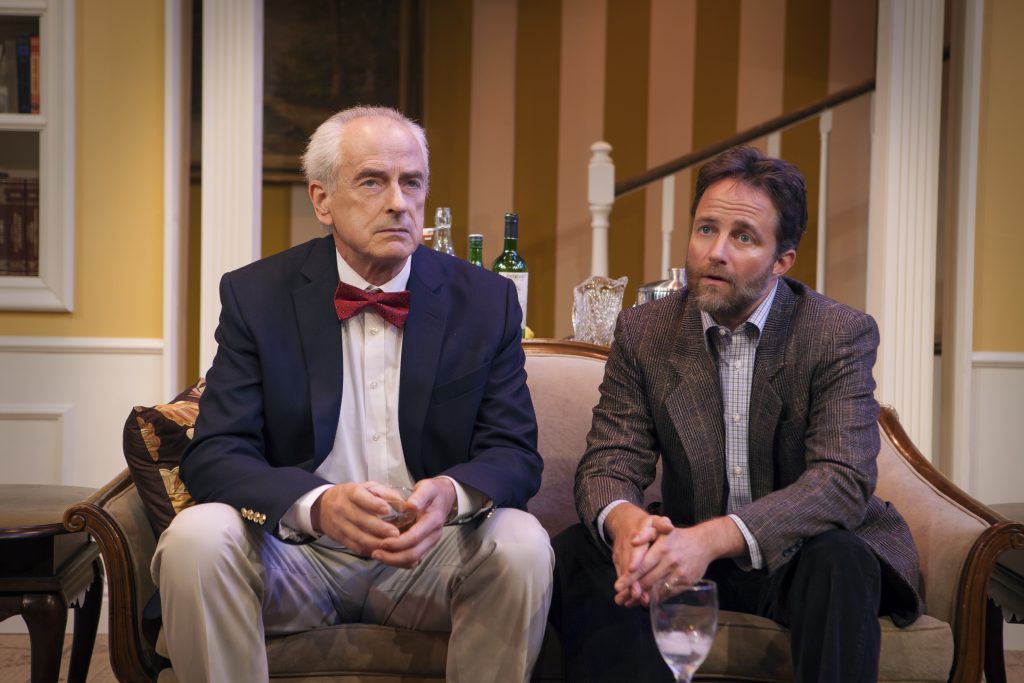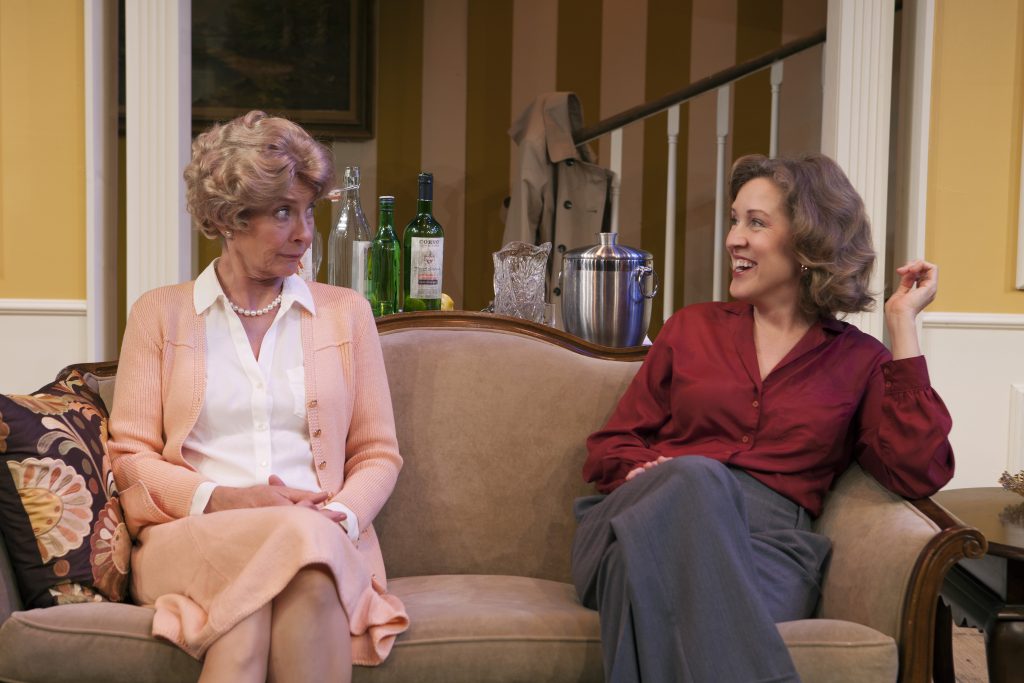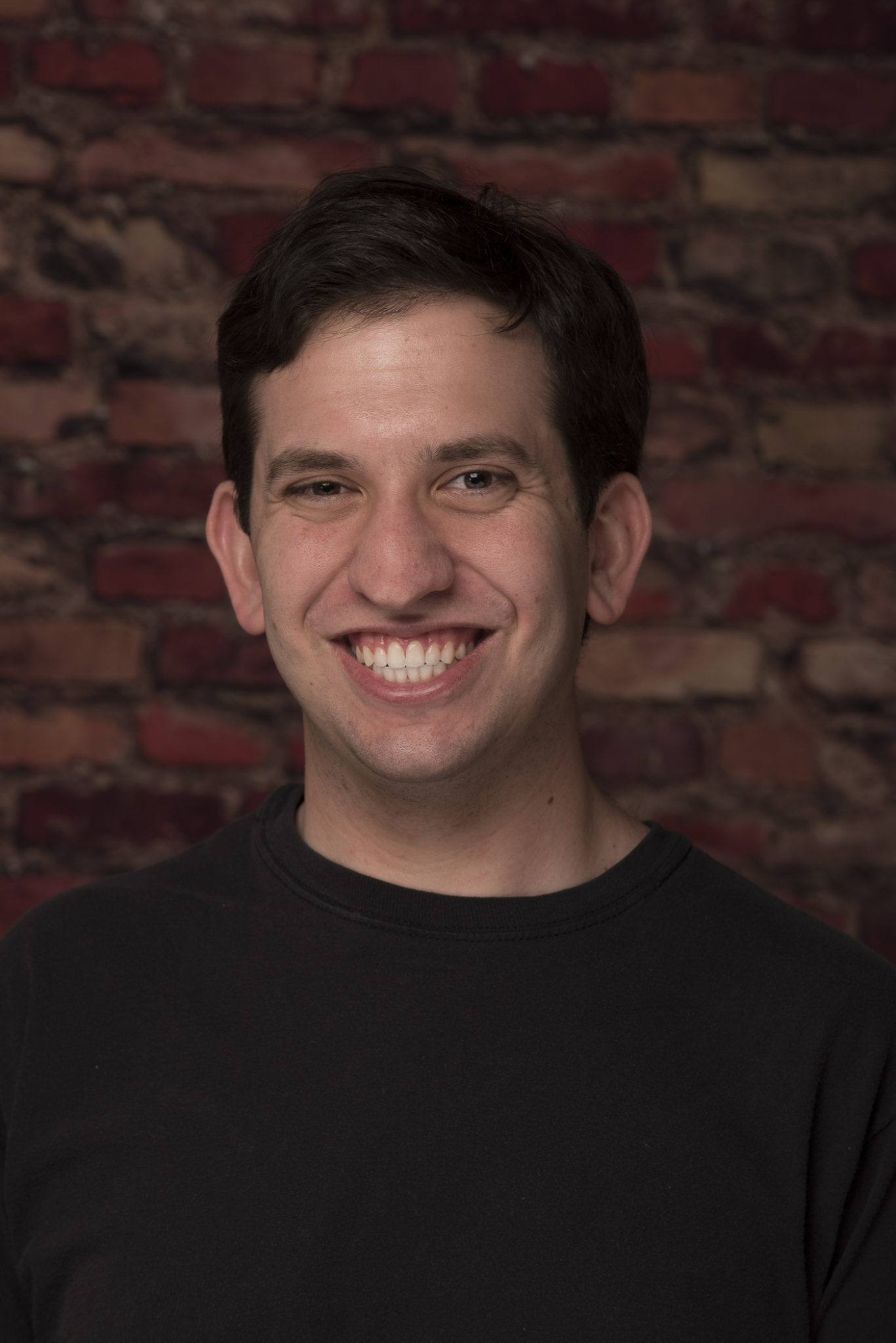East Coast Family Dysfunction

J. Michael Flynn and Chris Petschler. (Photos courtesy of Aaron Rumley.)
Set in the mid-70s, upstate New York, a stressed out publisher and playwright, John (Chris Petschler), visits his upper-class WASP parents. He is not very close with his patriarchal dad, Bradley (J. Michael Flynn), judgmental mom, Ann (Cristina Soria) or devoted and aggravated sister, Nina (Shana Wride).
John causes tension when he shares information about a draft of his new show entitled, The Cocktail Hour. His plot is influenced by reality, including a negative portrayal of his father. Bradley desperately tries to convince John to not finish his dramatic tale.
During interviews, Gurney stated that The Cocktail Hour was based on his own relationships with his parents. Audiences feel like a fly on the wall listening to discussions that reveal plenty about the characters.
Gurney’s writing subversively plays with the world of the stage. References to critics, dramatic twists and applause-worthy monologues never fail to amuse.
While many of Gurney’s quips are very funny to hear, certain bits are repeated a few too many times. One particular example is Bradley’s running gag about nudity in theatre. Although John’s initial remark is quite humorous, Gurney references the witticism later with very little reasoning. However, certain repeated jests end up paying off towards the end of The Cocktail Hour, particularly one involving Ann.
A fascinating theme is about the generational gap between John and his progenitors. Bradley and Ann have old-fashioned beliefs about family and work. They also are not open to the changing 70s culture. On the other hand, John evolved into an everyman and moved away from his roots as a preppy son.
Marty Burnett’s set reflects on the upscale lifestyle of the clan. The highly organized and well structured home signifies the initial sense of order in the abode.
Melanie Chen’s music selections, like the 1930’s jazz-standard, “Stompin’ at the Savoy,” contribute to the East Coast setting. Although the characters never mention the songs, the tunes are the kind of ones
Bradley and Ann would likely enjoy and play.
Act I ends uncomfortably as a serious chat threatens to turn the humorous plot into a gloomy one. To Gurney’s credit, the laughs keep coming even after the tense moments proceeding intermission.
Even though Act II doesn’t skimp on jokes, there becomes a more humane quality to John’s exchanges with his folks. The New Yorkers become sympathetic as they begin to open up with each other.
Flynn and Soria are almost too convincing playing a couple that annoy their son frequently by criticizing his passion for the arts. Though, they never become caricatures with their grounded performances.

Cristina Soria and Shana Wride.
As Nina, Wride might have the toughest job since the younger sibling is not an easy person to describe on paper. Nina feels her parents and brother don’t fully appreciate her as a person. Ironically, Nina is really more frustrated with herself and with her career, than with her family. Wride adds layers to the sad soul with emotional pain that is equally humorous and empathetic.
The chats throughout The Cocktail Hour feature a natural rhythm, due Reynolds’ staging. Her dialogue exchanges play in a realistic fashion, as opposed to rushing to some of the bigger revelations of the production.
With plenty to say about family dynamics, economic status and scriptwriting, The Cocktail Hour finds Reynolds in top form as a director. Be forewarned that the plot may trigger embarrassing flashbacks for certain theatregoers. They’ll likely want to get a drink immediately after the tale concludes.
[box] Show times are Wednesdays at 7:00 p.m, Thursdays at 8:00 p.m, Fridays at 8:00 p.m, Saturdays at 2:00 p.m and 8:00 p.m, and Sundays at 2:00 p.m and 7:00 p.m. [/box]

A fan of theatre from a young age, David Dixon began writing reviews while in middle school, for Union Tribune’s Rated G column and sdcnn.com. He was the Entertainment Editor for SDSU’s The Daily Aztec. Currently, he contributes to San Diego Community News Network, a regional reviewer for Talkin’ Broadway, an interviewer for San Diego Theatre Reviews and has won several San Diego Press Club Excellence in Journalism Awards. David is a San Diego Theatre Critics Circle member, an American Theatre Critics Association member & Regional Theatre Tony Award voter.


